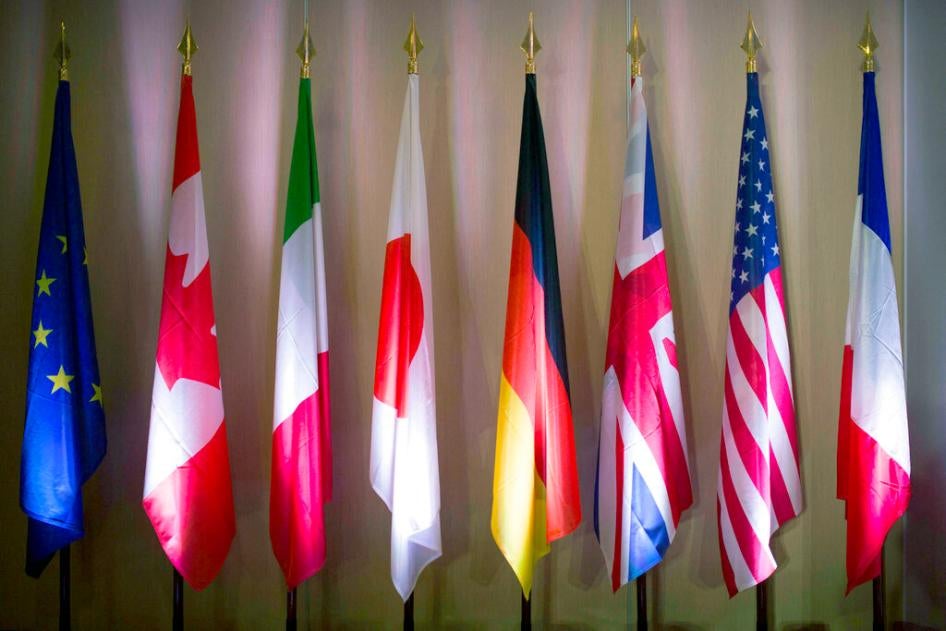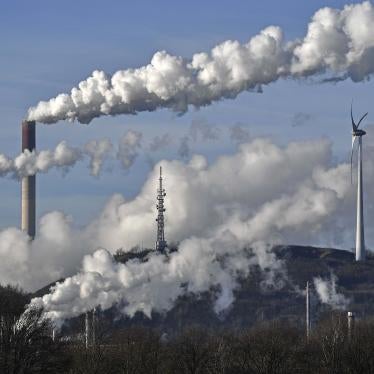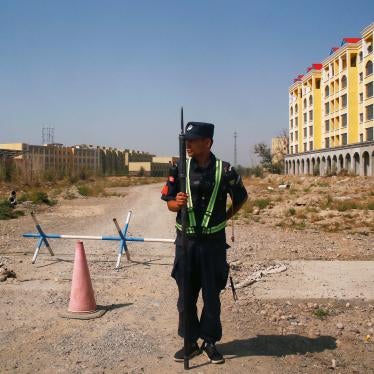Last week, in a public letter, Human Rights Watch called on the leaders of the United States, Canada, United Kingdom, France, Italy, Germany, and Japan to take concrete and decisive action facing the unprecedented challenges posed by the Covid-19 pandemic and global warming, as well as by worrying developments in China, Israel/Palestine, Belarus, Russia, and Myanmar, ahead of the G7 Summit on June 11-13. G7 members should use this Summit to collectively reaffirm and demonstrate their commitment to international human rights law and deliver on its promise to build back better.
June 2, 2021
Dear G7 leaders,
As the world undergoes profound changes, the forthcoming G7 Summit meeting to be held on 11-13 June should deliver on its promise to build back better. The respect and advancement of human rights are intrinsic to building back better, yet human rights are facing unprecedented challenges posed by the Covid-19 pandemic and global warming, as well as by worrying developments in China, Israel/Palestine, Belarus, Russia, and Myanmar.
The G7 Summit should be an opportunity for the assembled Heads of State and Government to collectively reaffirm and demonstrate their commitment to international human rights law through concrete and decisive actions.
In that regard, I am writing to draw your attention to recommendations made by Human Rights Watch that we urge the G7 to adopt at the Carbis Bay summit.
Covid-19
The Covid-19 pandemic has precipitated human rights crises across the globe, with widespread and devastating social and economic consequences. While the scale and severity of the pandemic’s public health threat justified some restrictions on rights, many governments ignored public health guidance and even used the pandemic as a pretext to abusively strengthen their grip on power. Meanwhile, rich governments have made opaque deals and prebooked the vast majority of vaccine supplies, exacerbating inequalities and largely opposing measures that could ensure poorer countries’ quicker and more affordable access to vaccines. Human Rights Watch calls on G7 members to urgently change course and ensure a rights-respecting exit from this public health crisis by:
- Supporting India’s and South Africa’s proposal at the World Trade Organization (WTO) to temporarily waive certain intellectual property rights under the Agreement on Trade-Related Aspects of Intellectual Property Rights (TRIPS). While we applaud the US government's decision to support a waiver and Japan's announcement that it would no longer obstruct text-based negotiations at the WTO’s TRIPS Council, we deeply regret that negotiations on the proposal remain stalled because other G7 members are still undecided or in opposition. Human Rights Watch is among the hundreds of civil society organizations around the world urging support for the TRIPS waiver to expand access to lifesaving vaccines and other health products. The measure has received increasing support ever since its initial proposal in October, including by 175 Nobel laureates and former Heads of State and Government, and the Director General of the World Health Organization (WHO); and
- Boosting manufacturing capacity in the developing world. While we welcome G7 leaders' attention to purchasing and distributing vaccine doses through the COVAX facility, which is worryingly underfunded, we urge the countries attending the G7 summit to go further by committing financial and logistical resources to develop a plan of action to scale up manufacturing and to use their regulatory powers and funding clout to enable technology transfers and sharing of data, know-how, and other intellectual property through open and non-exclusive licensing.
Human Rights Watch also calls on G7 members to support all governments’ ability to provide urgent economic relief to people whose livelihoods have been devastated by the pandemic, including by:
- Exercising their outsize voting power on the boards of the International Monetary Fund, World Bank, and regional development banks to enable robust investment in public health systems and bottom-up economic relief. Members should use all avenues available to them to promote transparent and accountable use of pandemic-related funding. At the same time, they should oppose conditionalities that harm rights, such as imposing fiscal targets that force governments to cut spending on health, education, housing, and social protection;
- Increasing and directing development assistance to scale up social protection systems. Such assistance could help co-finance social protection floors during the time of crisis, and provide financial and technical support to put in place more permanent structures; and
- Supporting debt relief where it interferes with governments' ability to provide economic relief essential to people's rights or to procure Covid-19 vaccines or other health products.
Climate Change
Since 2016, the G7 governments have all committed to phase out “inefficient” fossil fuel subsidies by 2025, a commitment reiterated last week by the G7 Climate and Environment Ministers. To fulfill this commitment, Human Rights Watch encourages the G7 to:
- Deliver time-bound and transparent action plans this year detailing how G7 members will meet stated commitment to phase out fossil fuel subsidies by 2025; and
- Immediately commit to no new international public finance for coal, oil, or natural gas projects, and to deliver time-bound and transparent action plans this year detailing how they will eliminate existing support for fossil fuels from international public finance institutions by 2025, including indirect support such as through related infrastructure, advisory services, technical assistance, or financial intermediaries.
China
The Chinese government is deepening repression in mainland China as well as Hong Kong, and is seeking to muzzle critics abroad. It is arbitrarily detaining human rights defenders and lawyers, tightening control over civil society, media, and the internet, and deploying invasive mass surveillance technology. The government imposes particularly heavy-handed control in the ethnic minority regions of Xinjiang and is responsible for serious, widespread and systemic violations against Uyghurs and other Muslims that amount to crimes against humanity. In this regard, Human Rights Watch urges the G7 to:
- Call on the United Nations High Commissioner for Human Rights to proceed with an investigation into grave abuses in Xinjiang, -even absent access to China, noting Beijing’s intransigence with regard to access and cooperation;
- Pursue G7-wide coordinated targeted sanctions against officials responsible for abuses. An obvious target should be Chen Quanguo, the Chinese Communist Party Secretary of Xinjiang, and the Xinjiang Production and Construction Corps (only the US has sanctioned these two; other recent sanctions have focused on lower-level officials);
- Insist that those responsible for crimes against humanity in Xinjiang should be held accountable and face justice; and
- Support and commit to work for the establishment of a standing mandate at the UN Human Rights Council to monitor and report on human rights violations across China.
Israel-Palestine
Israel maintains entrenched discriminatory systems that methodically privilege Jewish Israelis and discriminate against Palestinians. To maintain Jewish Israeli control over demographics, political power, and land, Israeli authorities have dispossessed, confined, forcibly separated, and subjugated Palestinians by virtue of their identity to varying degrees of intensity. In certain areas, the deprivations perpetrated by the Israeli government against the Palestinian population are so severe that they amount to the crimes against humanity of apartheid and persecution. Considering these crimes, Human Rights Watch calls on the G7 to:
- Urge the Israeli government to ensure without delay to Palestinians in the occupied territory protection of the civil rights that they are entitled to, using as a guide the protections it ensures for its own citizens; and to assess Israel’s conduct on this basis;
- Issue statements expressing concern about the Israeli government’s practice of apartheid and persecution;
- Vet agreements, cooperation schemes, and all forms of trade and dealing with Israel to screen for those directly contributing to the commission of the crimes of apartheid and persecution against Palestinians, mitigate the human rights impacts, and, where not possible, end the activities and funding found to facilitate these crimes;
- Support the Office of the Prosecutor of the International Criminal Court in its ongoing investigation into crimes committed in Palestine, including into individuals credibly implicated in the crimes against humanity of apartheid and persecution; and
- Urge Israel to reverse its policy of denying access to the Gaza Strip to human rights organizations seeking to investigate violations of human rights and international humanitarian law.
Russia
Repression in Russia is the most severe than it has ever been in the post-Soviet era and targets political opposition, critical media, peaceful protesters, independent groups, foreign organizations, and internet traffic. Russia is also responsible for assassinations and assassination attempts of Russians abroad. Human Rights Watch, therefore, urges the G7 to:
- Jointly and publicly condemn the unprecedented crackdown on human rights defenders and civil society and restrictions on the rights to freedom of peaceful assembly, association and expression;
- Jointly call on Russia to repeal the “foreign agents” legislation and the law on “undesirable” organizations, to amend the vague and overly broad extremism legislation, to end politically motivated prosecutions, and to stop all forms of persecution and harassment of human rights defenders, lawyers, journalists, and other civil society activists; and
- Urge Russia to release Alexey Navalny, drop abusive charges against him, drop the extremism court case against his organization, ensure effective investigation of the credible allegations that Federal Security Service officers poisoned him with Novichok nerve agent in 2020, and stop harassing, intimidating, detaining, and persecuting his supporters and other peaceful civic activists.
Belarus
In Belarus, the political opposition, democracy activists, lawyers, human rights groups, and independent media face severe abuses, including arbitrary arrests, bogus charges and trials, enforced disappearances, torture, and dismissals by the authorities. A shocking illustration of this repression occurred on May 23, when the government forced a civilian plane traveling between two EU member state capitals to land in Minsk and arbitrarily arrested prominent activist and journalist Raman Pratasevich and his girlfriend, Sofya Sapega. In the face of such acts, Human Rights Watch calls on the G7 to:
- Continue to jointly and consistently condemn the widespread, brutal crackdown on rights and peaceful protesters in Belarus, the politically motivated arrests of key opposition figures, and efforts to intimidate and silence dissenters, workers, students, journalists, human rights activists, and others peacefully exercising their rights to free expression and assembly;
- Condemn in the strongest terms the actions that led to the arbitrary arrest and detention of Pratasevich and Sapega, and convey serious concerns that they are at grave risk of torture and face long prisons terms on spurious charges;
- Press the Belarusian authorities to immediately and unconditionally release all prisoners held arbitrarily such as for political reasons, including all those arrested in relation to the protests against the August 2020 presidential elections, journalists, media workers, bloggers, and human rights defenders;
- Use all means possible, including further targeted sanctions against individuals and entities involved in the crackdown and continued impunity, to put pressure on the Belarusian authorities to put an end to gross and widespread human rights violations committed in the country since August 2020;
- Condemn the continued impunity for grave violations of international human rights law, including torture, ill-treatment, sexual violence, enforced disappearances, and killings by security forces, as well as the disproportionate and lethal use of weapons; and
- Insist that those responsible for serious violations of international law must face justice, and pledge G7 support for the UN Fact-finding mission established by the Human Rights Council, and for the Accountability Platform supported by a large group of states from the Organization for Security and Cooperation in Europe to gather, analyse, and preserve evidence of human rights violations in Belarus with a view to support justice for grave crimes.
Myanmar
In Myanmar, on top of the hundreds of killings and thousands of arrests since the 1 February coup, of increasing concern are attacks on the media, including the arrests of journalists who are citizens of G7 countries. The military has raided the offices of newspapers and online media and banned media outlets and satellite television. More than 70 journalists have been arrested since the coup, of whom at least 48 remain in detention. Meanwhile, the escalation of armed conflict in ethnic minority areas has forced almost 60,000 people to flee their homes. The country’s humanitarian situation is worsening across the board, with food and economic security plummeting. The United Nations Development Programme has warned that half of Myanmar’s population, about 25 million people, could be living below the national poverty line by early 2022. Despite the desperate situation, the people of Myanmar continue to protest and actively oppose the military. Civil society, protest leaders, and representatives of the democratically elected government are all continuing to call on the international community to impose economic sanctions on the companies that benefit the Myanmar military. They are calling on the G7 to act. Human Rights Watch consequently appeals to the G7 to:
- Adopt a tougher position on imposing economic sanctions and other economic measures to target the Myanmar military and its leaders. Sanctions imposed so far — on military leaders and companies, including MEC and MEHL and the gemstone and timber enterprises — are an important step forward. But governments now need to better target the massive foreign currency revenues that are bankrolling the military and giving it the capacity to purchase weapons and other items on the international market — transactions that are almost entirely conducted in currencies of G7 members. Every month, hundreds of millions of US dollars are paid to entities that are either already sanctioned by most G7 members or controlled by sanctioned entities. This flow of funds can and should be stopped. The G7 should announce new measures to target those revenues, focusing more on financial institutions that process payments that benefit sanctioned entities;
- Adopt a common position, or state unilaterally, that they support efforts to table a UN Security Council draft imposing a global arms embargo on Myanmar; and
- Signal that they will pursue all possible avenues for international justice, which include support for investigative efforts by UN bodies, referral of the situation to the International Criminal Court, and, where applicable, investigation under domestic law under universal jurisdiction laws. It is essential that G7 governments demonstrate to the junta that its abuses — and unwillingness to engage meaningfully with the UN and outside actors about restoring democratic rule — is coming at a severe cost to its economic interests and standing on the international stage, and that engaging in atrocities with impunity will result in international efforts to hold its leadership criminally liable.
Hoping for concrete and decisive action by the G7 at the Corbis Bay summit, I remain at your disposal should you require any further information.
Yours sincerely,
Kenneth Roth
Executive Director
Human Rights Watch








